|
|
|
Sort Order |
|
|
|
Items / Page
|
|
|
|
|
|
|
| Srl | Item |
| 1 |
ID:
132932
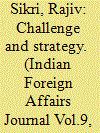

|
|
|
|
|
| Publication |
2014.
|
| Summary/Abstract |
For some time now, there has been a buzz about India's growing role in the world and a widespread feeling that India must play a much larger global role. Today, this feeling has become far more acute.
It is important, then, that there should be greater, and more widespread, awareness of foreign policy challenges faced by India, as well as a deeper understanding of the stakes and options for India's foreign policy. The public needs to be more knowledgeable about foreign affairs, which cannot be the concern only of those who exercise power in New Delhi. It is something in which every citizen should be involved. It is also essential that there should be a vibrant and constructive debate, especially involving the young, on where we are headed and why, because unless there is public support our foreign policy will not be successful. Some recent incidents pertaining to our relations with Sri Lanka and Bangladesh where the Chief Ministers of Tamil Nadu and West Bengal respectively forced the hand of the Central Government illustrate this point. I am glad that the BJP manifesto talks about having a "Team India" that brings together the Prime Minister and the Chief Ministers of States.
My conversation with you today is a small effort to create this awareness, perhaps stimulate your imagination and set you thinking.
|
|
|
|
|
|
|
|
|
|
|
|
|
|
|
|
| 2 |
ID:
132928
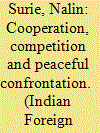

|
|
|
|
|
| Publication |
2014.
|
| Summary/Abstract |
The India?China relationship is already not a zero sum game. The potential for collaboration to mutual benefit though is much greater whether from the perspective of learning from each other's socio economic programs and successes, for bilateral economic relations or cooperation in regional and international programs. However, for this to be realised in greater and greater measure will require the development of much greater mutual trust and a mindset change, especially in our largest neighbour
|
|
|
|
|
|
|
|
|
|
|
|
|
|
|
|
| 3 |
ID:
132930
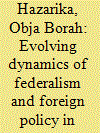

|
|
|
|
|
| Publication |
2014.
|
| Summary/Abstract |
Although, the central government in India has been constitutionally empowered to decide on foreign affairs, this article has attempted to portray that sub-national units have influenced and affected external engagements to a certain extent. The central government as well as foreign audiences have acknowledged the role of the states of India in external engagements and have often included them in discussions and negotiations relating to foreign affairs. Sub-national diplomacy has taken varied manifestations in India. First, states have embarked on economic diplomacy with foreign audiences. Secondly, states sharing an international border have influenced neighbourhood policy and thirdly, regional parties, which have served as coalition partners at the centre have often leveraged their status to exert pressure on the centre in certain foreign policy decisions. The centre, being the final authority on external affairs in India, must continue to conduct foreign policy with an aim to secure the national interest of the country as well as to ensure that the legitimate interests and concerns of the states are adequately accommodated.
|
|
|
|
|
|
|
|
|
|
|
|
|
|
|
|
| 4 |
ID:
132925
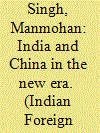

|
|
|
|
|
| Publication |
2014.
|
| Summary/Abstract |
Above all, India and China need a stable, secure and prosperous Asia Pacific region. The centre of gravity of global opportunities and challenges are shifting to this region. In the coming decades, China and India, together with the United States, Japan, Korea and the ASEAN Community, will be among the largest economies in the world. While this region embodies unparalleled dynamism and hope, it is also one with unsettled questions and unresolved disputes. It will be in our mutual interest to work for a cooperative, inclusive and rule-based security architecture that enhances our collective security and regional and global stability.
|
|
|
|
|
|
|
|
|
|
|
|
|
|
|
|
| 5 |
ID:
132931
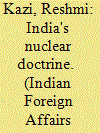

|
|
|
|
|
| Publication |
2014.
|
| Summary/Abstract |
The aim of India's nuclear deterrence capability has been to safeguard itself against blackmail and coercive diplomacy of adversaries. Its doctrinal principles of minimum nuclear deterrence and NFU are consistent with India's declaration of a modest nuclear weapons policy. The official announcements, in the aftermath of the May 1998 tests indicated that India has set out on a pragmatic course of action. Sixteen years after the tests, the Indian government's policies reflect this approach substantially.
|
|
|
|
|
|
|
|
|
|
|
|
|
|
|
|
| 6 |
ID:
132929
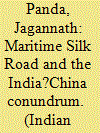

|
|
|
|
|
| Publication |
2014.
|
| Summary/Abstract |
India-China maritime dynamics are witnessing new developments and balance of power politics. Beijing's economic and maritime posture continues to emerge as a challenge for India. In fact, underlying China's Maritime Silk Road strategy is an orderly diplomatic, economic, and maritime quest for power that India must take note of. A core aim behind this strategy is to re-brand China as an economic, political and maritime power in IOR as well as in the neighbouring region. In official parlance, this enterprise is intended to integrate Beijing's existing levels of cooperation in the region, and to look beyond. As Hua Chunying, spokesperson of the Chinese Foreign Ministry, stated on 13 February 2014, "This is an initiative and idea of cooperation, which will help integrate all the on-going cooperation programmes, especially those in connectivity with the concept and spirit of the ancient Silk Road.". India and other countries need to take note and respond to this discourse.
|
|
|
|
|
|
|
|
|
|
|
|
|
|
|
|
| 7 |
ID:
132926
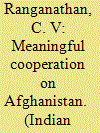

|
|
|
|
|
| Publication |
2014.
|
| Summary/Abstract |
The approaching end game in Afghanistan, marked by the withdrawal of American and NATO troops, draws attention to the urgency of the pursuit of cooperation in the security sphere between India, China, Pakistan, and other neighbors of that country. Even as various diverse fields in bilateral relations between India and China continue to grow the issue of constructive and meaningful cooperation with regard to the future of Afghanistan should be considered an important test of the quality of the relationship, having a vital bearing on the peace, stability, as well as the economic and social development of the Indian subcontinent.
|
|
|
|
|
|
|
|
|
|
|
|
|
|
|
|
| 8 |
ID:
132927
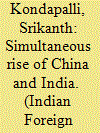

|
|
|
|
|
| Publication |
2014.
|
| Summary/Abstract |
The above brief depiction of the bilateral and multilateral interactions between India and China suggest that the new leadership in China views relations with India as being important but, overall, subservient to its equations with Washington. As China became the second largest economy in the world in 2010, and is poised to overtake the USA in GDP terms, Beijing is concerned with the possible negative outcomes of this 'power transition' - much like Germany and Japan faced in the 1930s and 1940s. For instance, Beijing has expressed concerns about USA's 'rebalancing in the Asia-Pacific', although it is the major beneficiary of the G-2. In order to cushion its rise further in a sustained manner in the international and regional orders, China is working momentarily with other emerging countries on issue-based coordination. India in turn needs to evolve policies which are based on its own self-interest; make choices that contribute to its capacity build-up; make its territorial integrity more secure through conventional and nuclear deterrence; make active efforts to re-shape the regional and international environment conducive to its rise and avoid being marginalised at a minimum, as well as protect and expand its rightful place in the international system through an inclusive and democratic architecture.
|
|
|
|
|
|
|
|
|
|
|
|
|
|
|
|
|
|
|
|
|